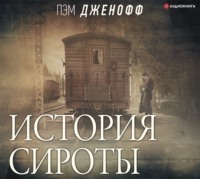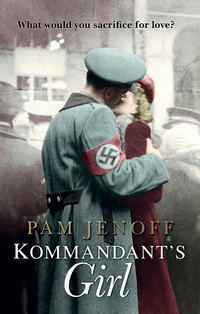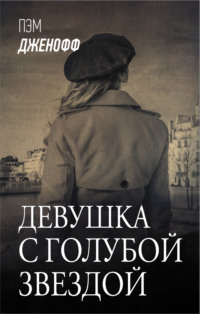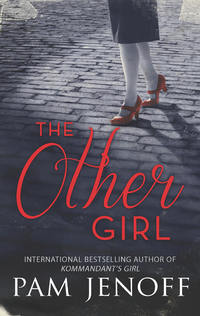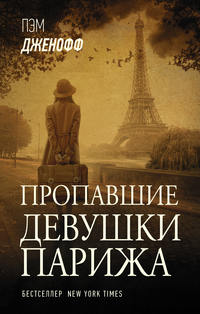
Полная версия
The Last Embrace
The leaner twin cocked his head. “She must be the greenhorn from Italy that Dad mentioned.” How did they know about me? I blinked, caught off guard by the rudeness of his tone. My cheeks reddened and I started to turn. Coming downstairs had been a mistake.
“Don’t mind Liam,” said the oldest boy, his voice low and resonant. I stared up, not answering. He was even more handsome up close, with hazel eyes and a wide smile. Bright sunlight seemed to cast a halo of gold around him. “I’m Charlie.” My breath caught. I brushed my hair from my face, trying to think of something to say that would impress him, make him take notice. He cupped his hand on the head of the youngest boy standing beside him. “And this is Robbie.”
I smiled down at Robbie, who had wide, round cheeks that seemed to cushion his eyes, and front teeth still a bit too big. He stood very straight, trying to look taller in a way that I recognized from doing it myself. “Nice to meet you,” I said solemnly.
“Adelia,” Charlie said, as if trying my name on for size. Hearing him say it, my insides warmed. “That’s a mouthful. Is it okay if we call you Addie?”
I nodded, liking the short, easy sound. “Si. I mean, yes.” I blushed. My knowledge of English was not awful. Mamma had insisted that I learn other languages since I was a child. I had read as much as I could since coming here, mostly Ladies’ Home Journal and the other women’s magazines Aunt Bess loved. And I had listened to the radio programs, too. But I had not had much opportunity to practice speaking and when I was nervous it all seemed to fade away.
“Come meet our mother.” Before I could reply, Charlie strode across the lawn, covering it in about two steps. The others followed. “Mom!” The red-haired woman emerged from the house, wiping her hands on the apron that covered her light blue shirtwaist dress. “This is Addie. She’s staying next door.”
The woman smiled with a kindness that said she had heard about me. “Hello! We’ve been summer neighbors of your aunt and uncle for years, though we usually get here a good deal earlier. I’m Doris Connally.”
“Where did you come from?” Robbie interjected.
“From Trieste, in Italy. On a boat.”
“All by yourself?” he asked. I nodded, standing straighter.
“Well, that’s something,” Mrs. Connally said, her voice full of admiration. “I normally wouldn’t even make the trip down to the shore by myself, but my husband had to work and the boys wanted to be here for the fireworks on the Fourth.”
“Who lives there with you?” Robbie resumed his interrogation, pointing up to the screened porch where I had stood minutes earlier.
“Just my aunt and my uncle.”
“No brothers or sisters? Any pets?” I shook my head twice, trying to keep up with his questions. “Boy, you’ll sure be glad to have us around!” His brothers chuckled.
Robbie turned to his mother. “Can we keep her?”
“Robbie, she isn’t a puppy. But I do hope you’ll join us often,” she added.
“Because we really need more kids,” Liam said wryly. His words stung. But he did not sound as though he was trying to be mean, just truthful.
The yellow dog I’d seen earlier bounded down the porch steps and stopped at Liam’s feet. “This is Beau,” he added, face softening.
“Jack and Liam must be about your age,” Mrs. Connally remarked.
“I’m sixteen.” I heard my accent again, the way my voice did not sound like theirs.
“I’m taller,” said Liam improbably.
“Okay,” I conceded, because it seemed to matter to him a great deal.
“Would you like to join us for lunch?” Mrs. Connally offered. “I haven’t much ’til we get to Casel’s, just sandwiches.”
I still could not get over the way Americans spoke so casually of food—something I would never again take for granted. “I wouldn’t want to impose.”
Mrs. Connally smiled. “Hardly. With these boys, I’m already cooking for an army. Come on, everyone. Let’s eat.”
Charlie lifted Robbie across his shoulders like a sack of potatoes and started for the door with the twins at his heels. Inside, the house was airy and cool. There were little touches, like the carved oak bannister and wide windows, that said the house had been built for someone to live in year-round, and not merely as a vacation home.
As we passed through the living room, I paused to admire a chess set which sat already unpacked on a low table. “It’s lovely,” I said, fingering one of the carved wooden rooks.
“Do you play?” Charlie asked with new interest.
I tried to calm the fluttering in my stomach. “I did. My father taught me.” In recent years when he had become broken and withdrawn, it was my one way to still connect to him. Papa had no one to play with him now. I imagined the chessboard sitting unused by the fireplace in our apartment in Trieste. It had been my dearest possession—the one thing I might have brought with me, had I known I was going.
I followed Charlie through the open boxes that littered the floor to the freshly scrubbed kitchen smelling of lemons. Mrs. Connally unpacked a basket of meats and cheeses and began slicing thick white bread. My stomach rumbled embarrassingly. Even after several weeks here, every meal felt as though it might be my last.
The boys whooped and hollered their way to the kitchen table, its enamel top scratched from years of use. Charlie plunked Robbie down in his chair before grabbing Liam and Jack under each arm and pretending to bang their heads together.
“Boys!” Mrs. Connally admonished, but her tone was good-natured, as if the chaos was normal. She turned to me. “Why don’t you sit here next to me where these little rascals can’t bother you.”
“Thank you.” I slid into the chair Mrs. Connally indicated, then looked hopefully at the empty seat next to mine. But Charlie dropped down between the twins on the other side of the table.
Mrs. Connally passed me a plate of sliced tomato. “We just bought these at a farmer’s stand on the way into town.” The piece I took was warm. Biting into it, I was taken back to sun-soaked holiday afternoons at the cottage outside Trieste, filling our baskets with tomatoes off the vine for Nonna to make her thick sauce.
Mrs. Connally handed around the platter of sandwiches and glasses of milk. The kitchen turned quiet as the boys attacked their lunches. Each of them ate differently. Charlie wolfed his meal down in great bites, barely pausing between mouthfuls to breathe or speak. Jack was meticulous, as if auditioning for a part. Liam sat back and nibbled disinterestedly, while Robbie played with his food just shy of irritating his mother. I ate carefully, taking care not to leave crumbs.
From where I sat at the kitchen table, I could see that the house was a bit down-at-heels, the paint peeling and woodwork worn. “It’s been in my family for generations,” Mrs. Connally said, seeming to notice. “It’s a lot to keep up, but I couldn’t bear to sell it.”
“We live in South Philadelphia back home,” Jack offered between bites.
“We do, too, I think. Fifth and Porter,” I said, repeating the location I’d heard from Aunt Bess.
“That’s the Jewish neighborhood,” Liam observed.
“Liam, mind your manners,” his mother cautioned.
“Is it true that Jews don’t believe in Jesus?” Robbie asked. I nodded. His eyes widened with disbelief. “We’re Catholic.”
“Sort of,” Charlie corrected. “Dad is, and we go to church sometimes. But Mom is a Quaker.”
“What’s that?”
“It’s just a different kind of church,” Mrs. Connally replied. “And we Quakers are pacifists, which means we don’t believe in fighting or war.” Still not fully understanding, I made a note to look up the words later.
“Is that why you don’t want America to help stop Germany?” Charlie asked his mother. His voice was rich and resonant. “Because you’re a pacifist?”
“Partly, I suppose. Mostly it’s because I have four sons.” My heart sank. I had heard such talk at the drugstore and among Aunt Bess’s friends. Back in Italy, I’d just assumed that the Americans would come and help stop the Germans, that it was only a matter of time. How could they not? But here people spoke of the war as though it were unreal, a book or movie, or simply someone else’s problem.
“We live about ten blocks from you,” Jack said. I turned to him, grateful for the return to an easier subject.
“You’ll attend high school in the fall?” Mrs. Connally asked me.
“Ugh, only Mom would ruin a perfectly good lunch with the S word.” Liam ducked as his mother swiped at him playfully, then tried to wipe mustard from the corner of his mouth.
“At South Philadelphia High School, I think.”
“It’s called Southern,” Liam corrected disdainfully.
“Us, too,” Jack chimed in. “Charlie’s gonna be quarterback of the football team.”
Charlie shrugged and waved his hand. “We don’t know that yet.”
“Naw, unless Tommy Thompson decides to stroll down from Eagles’ practice and try out, I think you’re in like Flynn.” I smiled, trying to look as if I understood.
When the food was gone, I stood to help Mrs. Connally clear the plates, then returned to the table. She passed each of us a miniature Hershey’s bar. I stared in disbelief. Aunt Bess’s idea of a treat were the cookies she’d brought from the kosher bakery in the city, dry even before they had gone stale. I had not had chocolate since coming to America. “Thank you.” I tore off the paper and popped the whole thing in my mouth. Sugar rushed through me, heating my blood.
“You kids go on back outside while I clean up and unpack a bit more.” The boys pushed back their chairs from the table and started for the door.
Outside, Robbie held a baseball bat he had pulled from one of the boxes. “Wanna play?”
“She’s a girl,” Liam sneered derisively.
I bristled. What was his problem? “Sure.” In truth I’d never played before, but I wasn’t about to admit it to him. The bat I took from Robbie felt strange and cumbersome in my hands.
“Here.” Charlie walked over and adjusted my hands, his fingers pressing warm on my own. Jack threw the ball in my direction, soft and slow. I swung and then released, putting all of my weight behind the movement as the bat made contact with the ball. It sailed high into the yard on the far side of the Connally house and there was a sudden crash, followed by the sound of shattering glass.
I dropped the bat. Everyone froze. “Uh-oh,” Robbie said. His jaw dropped.
A man came around the fence angrily holding the ball. “Who broke my car window?”
I hesitated, trembling. “I did,” a voice behind me said. I turned, surprised to see Liam stepping forward before I could speak.
Mrs. Connally burst through the door. “Liam, how could you? I’ve warned you boys about playing ball by the houses.” She reached into the pocket of her dress as she walked toward the man. “Mr. Steiner, I’m so sorry,” she said, handing him some dollar bills. “This should cover it.” The man took the money and walked off with a harrumph. Mrs. Connally turned back to Liam, hands on hips. “You are grounded and no allowance until you earn back what I just gave Mr. Steiner.” She stormed back into the house.
I turned to Liam. “You took the blame for me.”
He shrugged. “People expect me to get in trouble. No one would believe it was a girl who hit that far anyway.”
I opened my mouth to issue a retort and then thought better of it. “Thank you.” But he just stomped off around the side of the house.
I walked to the door of the Connally house and knocked softly. “Ma’am?”
Mrs. Connally knelt over a box, unpacking clothes. “Come in, dear.”
“It was me who hit the ball and broke the window.” Mrs. Connally looked up, surprised. “Liam was just protecting me.”
Mrs. Connally straightened. “Why didn’t you say anything?”
I looked away. “I know I should have. I’m sorry. But I is, I mean was, was afraid.”
“Afraid of what?”
I swallowed. “That they would send me back.” Something had changed in the past few weeks, I realized. Though I desperately missed my parents and wished they would join me here, a growing part of me wanted to stay in America—today, having met the Connallys, more than ever.
“To Europe? Oh, honey.” Mrs. Connally opened her arms and I stepped into them, inhaling the cinnamon smell. “That won’t happen. This is your home now.”
I relaxed slightly, secretly relieved—and a bit guilty for feeling that way. A moment later, I pulled away. “I should let my aunt know where I am.” Really, Aunt Bess would not be back for hours, but I didn’t want to overstay my welcome.
“Well, hurry back.” I tilted my head, not understanding. “You’ll go to the beach with us.”
I faltered. I’d managed to avoid the beach since coming here. Aunt Bess had offered to take me once, but I’d made excuses and, though puzzled, she hadn’t pressed. I could not tell Mrs. Connally about my fear of the water, which seemed silly even to me—and I did not want them to go and leave me behind. “I’ll be right back.” I hurried next door to the boardinghouse, finding the polka-dot bathing suit Aunt Bess had bought me, with the Gimbels tags still on it.
When I walked downstairs a few minutes later, the Connallys had assembled in front of their house, buckets and other beach toys in hand. I stopped, suddenly self-conscious of my new suit. When Aunt Bess had given it to me, I’d loved the bright pink color and ruffles. Now I was embarrassed at how it clung in some places and gapped in others.
“Wait for me,” Robbie called, struggling to keep up with his brothers’ long strides as we started down the block. Charlie reached down and scooped up Robbie, then hoisted him to his shoulders.
I studied the boys out of the corner of my eye as we walked. Liam looked more like Charlie than his own twin. With the same almond-shaped eyes and angular jawline, he was almost a copy of his older brother. He was much slighter, though, and his skin was a paler shade. They stood opposite one another like sun and moon. Charlie’s movements were sure and deft and he seemed to hover above his brothers, guiding their movements, steering Jack around a pothole so he didn’t trip, then putting out an arm to stop Robbie before he stepped into the street. The other boys fell in behind him like geese following in formation. I was drawn closer, longing to walk beneath his protective wing and be one of them.
We soon reached the boardwalk that separated the road from the beach, wide planks forming a neat pattern with a railing that overlooked the sea. Just to the north loomed the Chelsea and other grand hotels. As we climbed the worn plank steps, I could hear waves crashing hard on the other side, so different from the calm Adriatic I’d known as a child. I froze, nauseous. I’d had the nightmares for as long as I could remember, of dark waters rising and pulling me under. The week on the ship, feeling the water rolling beneath, had been nearly unbearable. But this was worse, because even though I had never been to this beach, the spot where we now stood looked exactly like the nightmare I’d had for a lifetime.
Charlie set Robbie down. Robbie scampered onto the sand, racing to a dune that lay just below. He began to climb it. But as he neared the top, he wobbled. A look of sheer terror crossed his face as he lost his footing and began to tumble. “Robbie!” his mother cried with alarm.
Charlie raced up from behind me. In two swift strides, he reached the bottom of the dune and extended his arms, catching Robbie neatly in midair. “You need to be more careful,” Charlie scolded as he set Robbie down. “I’m not always going to be here to save you.” But the protective note in his voice suggested otherwise.
I hung back as the boys ran ahead down the wide beach, which was dotted with other groups of bathers, women in stylish swimsuits reading magazines and families with small children digging for sand crabs and splashing in the surf. To everyone else, the beach was a happy, relaxed place.
“Are you all right?” Mrs. Connally asked, noticing my distress. She adjusted the wide brim of her straw hat, then took my arm. “Come, let’s set up.” I followed her to the spot where the boys had cast down their things, and helped spread out the blanket. I tried not to stare as Charlie pulled off his shirt, revealing a broad torso and muscular shoulders. His eyes traveled in the direction of a girl a few years older than me, sunning herself in a suit with a cut-out midriff. My heart sank; I could never hope to fill out a swimsuit like that.
“Are you coming?” Charlie asked as he started toward the water. I shook my head. “I’ll take you,” he offered, softer now, seeming to sense my fear. How I wanted to trust him! I almost felt as if I could.
Then a wave rose behind him and thundered down. Panic gripped me once more. “You go on.” I stretched out in what I hoped would be a glamorous position on the blanket. A biplane buzzed overhead, advertising the diving horse show at Steel Pier.
Jack settled down beside me on the blanket and pulled a book from his mother’s bag. The Red Badge of Courage; I’d never heard of it. “Summer reading assignment,” he said, noticing me looking.
“Oh.” I didn’t know if I was meant to be reading something over the summer. “I’m worried,” I confessed.
“About school? Don’t be. I’m sure the other kids are going to like you a lot.” Jack smiled so brightly I almost believed him.
“It’s the schoolwork. I’m mostly nervous about the writing.”
“Why don’t I help you? Tutoring, they call it.”
Robbie peered over Jack’s shoulder. “Whatcha doing? Homework in summer. Aack!” He ran away.
“It’s the beach, for goodness’ sake!” Liam protested as he followed Robbie to the surf.
“Buddy system!” Mrs. Connally called after them. Her eyes darted back and forth attentively, never leaving the water.
“Don’t worry, I’ve got them,” Charlie called from the water’s edge. He dove in without hesitation, then swam out to meet his brothers, his stroke as smooth and confident as a lifeguard.
“Come on, Addie!” Robbie cried, his voice drowned out by the crashing of a wave. I watched longingly, wanting for once to take part in the fun, instead of simply standing on the sidelines watching.
But I couldn’t. Instead, I took some of the lotion Mrs. Connally offered. Sand from my fingers mixed with it as I rubbed it into my arms. I inhaled deeply, gazing northward down the beach where the boardwalk bustled in front of the Claridge Hotel and Convention Hall. Haze swirled around the top of the roller coasters and other amusements on the piers that jutted out into sea. The air was salty but curiously sweet, a bit of taffy or caramel corn drifting in from the piers.
A few minutes later Jack closed his book and went to join his brothers in the water. I lay back, squirming against some sand which had worked its way into the bottom of my bathing suit. I closed my eyes and let the sun lull me into a semi-nap. My parents appeared in my mind. We had been happy once like the Connallys. I saw Mamma and Papa dancing around the kitchen, the three of us and Nonna enjoying long leisurely meals of fish and cheese and bread out on our balcony in summertime. When I was ten, I had asked if it was the lunches that were making Mamma’s belly round. She just laughed. She and I spent long days strolling the city, wading in the fountains and pointing out interesting things until it was time for Papa to come home.
Only one day he didn’t. At first Mamma tried to be cheerful. “He’s just gone to see friends,” she reassured. But a night passed, then another, and then she forgot to maintain her pretense of calm. She left me with Nonna and did not return by morning. I tried to pray in the darkness at night for their safe return. Please, I said over and over again, because I did not know any other words. It seemed to work, because two days later Mamma came back. She was pale and drawn—and still alone. She took to her bed. Nonna ran for the doctor.
A few days later, Mamma emerged, but her stomach no longer swelled as much. “Is Papa still with friends?” I asked.
Mamma shook her head. “No,” she replied bluntly, not bothering to cushion the truth. “He’s been arrested.” My heart froze. I’d seen a man once, taken from the street by the police. People whispered that he would not come back. I prayed more, adding more pleases until I was saying the word a thousand times each night before finally falling asleep.
Papa did return a week later, walking through the door as unexpectedly as he had disappeared. He looked the same, right down to the same clothes, now dirty and creased. He’d even managed to keep the mizpah heart and not have it taken. But he fell into a chair with a wince that suggested he was hurting on the inside, and a haunted look in his eyes that did not go away. He did not return to his work after that but wrote from home, welcoming in the occasional visitor. Instead it was Mamma who took to the streets, leafleting and attending meetings and protests against the Fascist regime, calling for elections.
I jumped as a drop of cold water hit my back and the vision evaporated. I rolled over. Liam stood over me, a mischievous grin in his eye. He had come up from the water’s edge, shaking droplets of water from his hair like a wet dog.
“Why, Addie,” he drawled. “You haven’t even gotten wet. You’re missing all of the fun.”
“I’m fine,” I protested, but he reached down and picked me up. I tried to pull away but his wiry grip was surprisingly strong.
“Liam Scott Connally, don’t you dare!” his mother began to admonish, but it was too late. Her voice faded as Liam carried me toward the water. “Please put me down,” I begged, flailing. But he stared straight ahead, not listening. The boy who just hours earlier had protected me from a neighbor’s wrath over a broken window was now my tormentor.
I closed my eyes, knowing what was coming next. The waves thundered in my ears, a sound I had heard thousands of times in my nightmares. Water splashed around Liam’s ankles as they reached the surf, kicking up the icy spray against my bare skin. Then he let me go. I screamed as cold darkness enveloped me. I reached wildly for the bottom, trying without success to find my footing. A powerful wave slammed into me from behind, tossing me like a ball until I could no long figure out which way was up. I flailed my arms, panicking. Water filled my nose and mouth, salt where air should have been.
Suddenly I was lifted to the surface. “Hey.” Charlie’s strong arms encircled me, holding me close as I coughed the water from my burning lungs. “It’s okay. I’ve got you.” He had reached me in a few long strokes. “Easy.” His voice was soothing. He raised me higher as a wave lifted them so it would not break on me. “I’ve got you.” I did not answer, but leaned my head against the wetness of his chest, still trying to catch my breath.
A second later Jack reached us. “Addie, are you okay?”
“That was so cool,” Robbie exclaimed, dog-paddling up from behind. He and Jack followed Charlie as he carried me to shore.
Charlie neared the beach blanket and set me down gently. Mrs. Connally wrapped a towel around me. “Liam, how could you?” she demanded. “Addie, are you all right, dear?”
“It was a joke,” Liam replied defensively.
“You idiot,” Charlie swore. Liam’s face crumpled and he slumped forward, as though he had been punched in the stomach. Clearly his older brother’s opinion meant everything.
I nodded and assured Mrs. Connally I was fine. A man carrying a white ice cooler on his back walked down the beach calling out, “Ice cream!” Mrs. Connally fished in her bag for coins. “Come with me, boys,” she said, standing. Robbie and Jack started after her. Liam hung back, watching Charlie, as if wanting to make what he had done all right. But Charlie did not look away from me, until finally Liam followed the others reluctantly.
Charlie put a hand on my shoulder and slid closer. “You want to talk about it?”
My trembling eased slightly. “There’s nothing to tell.” I fought the urge to put my head on his shoulder. Though I’d only just met Charlie, he seemed to have a way of making everything okay—even the beach.


